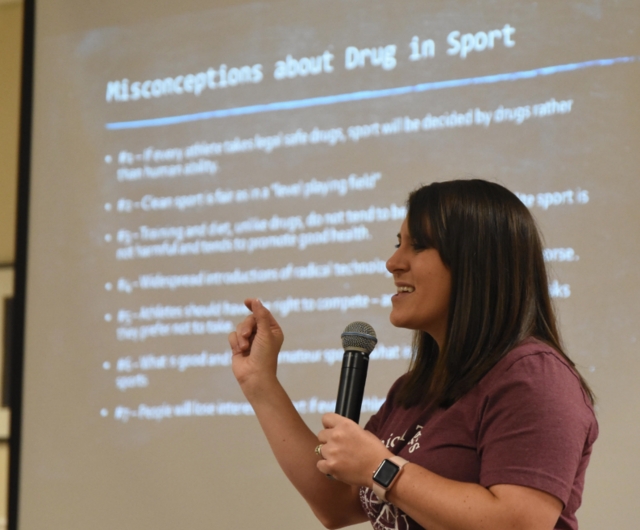| ||||||||||
Dr. Ronald P. Rogers CHIROPRACTOR Support for your body's natural healing capabilities 270-384-5554 Click here for details 


Columbia Gas Dept. GAS LEAK or GAS SMELL Contact Numbers 24 hrs/ 365 days 270-384-2006 or 9-1-1 Call before you dig Visit ColumbiaMagazine's Directory of Churches Addresses, times, phone numbers and more for churches in Adair County Find Great Stuff in ColumbiaMagazine's Classified Ads Antiques, Help Wanted, Autos, Real Estate, Legal Notices, More... 

|
Lauren Willis delivers QEP lecture at CU By Ariel C. Emberton Campbellsville, KY - Lauren Willis, assistant professor of human performance at Campbellsville University, spoke at one of CU's Quality Enhancement Plan (QEP) Lecture Series Nov. 13 on the "Case for Legalizing Performance Enhancement in Elite Sports." Her speech focused on why athletes in elite sports, such as football and basketball, choose to use performance enhancements and whether it is an ethical practice. "This is another advancement in sports that is on the horizon," Willis said. The lecture included topics such as tech advancement in sport history, usage in the 19th century Olympics and a 1928 ruling against enhancement usage. Willis is one of several faculty members participating in the faculty lecture series. She talked about how people who use the enhancements often go undetected because only 10 to 15 percent of elite athletes are tested a year. Those who do get discovered are often given a fine, slapped on the wrist and sent on their way. There is no accountability and athletes are willing to pay the fine and move on. "The policy is broken because they are focused on whether or not they are using instead of if it is harming their liver," Willis said. Arguments against usage were that it would create an unfair advantage for those who are using versus those who are not. It is also argued that enhancements would create an unleveled playing field and compromise the sport. When the opposing side was argued, Willis said the benefits of enhancement would include more excitement during games, more money would be made, athletes are less likely to cheat and it would close the performance gap. Women who use enhancements might be able to dunk and make half court shots like men do, according to Willis. Following Willis' presentation, a group discussion took place where those in attendance were given the opportunity to share their thoughts. Each table looked at the facts of the case, the options, the consequences for using and they made a choice as to if they would choose to use the enhancements or not. Students were asked to share their thoughts and Willis said that even though she does not agree with performance enhancers, she feels they will soon be making their way into elite sports. Willis is a two-time graduate from CU. In 2012 she graduated with her Bachelor's of Science in Health and Physical Education and in 2015 she graduated with a Master's in Theology. Willis began working as an enrollment counselor after graduating and is now serving as the head women's golf coach and assistant professor of human performance. This story was posted on 2018-11-26 05:52:06
Printable: this page is now automatically formatted for printing.
Have comments or corrections for this story? Use our contact form and let us know.
More articles from topic News:
Hanging of the Greens at Cane Valley Baptist Sun 2 Dec 2018 Video: A.J. Jacobs on giving thanks for a cup of coffee ACPC SBDM regular meeting Mon 10 Dec 2018 Commentary: Am I the only one who mourns? It's Small Business Saturday It's been a joyous TG on the Lane before treatment begins again Rhiannon Cravens participates in Indy Circle of Lights Beware scammers urging help for family member in trouble CU to present A Christmas Story Dec. 6-9, 2018 KY farmer pleads guilty $2.6M crop-insurance fraud View even more articles in topic News |


|
||||||||
|
| ||||||||||
|
Quick Links to Popular Features
Looking for a story or picture? Try our Photo Archive or our Stories Archive for all the information that's appeared on ColumbiaMagazine.com. | ||||||||||
|
Contact us: Columbia Magazine and columbiamagazine.com are published by Linda Waggener and Pen Waggener, PO Box 906, Columbia, KY 42728. Please use our contact page, or send questions about technical issues with this site to webmaster@columbiamagazine.com. All logos and trademarks used on this site are property of their respective owners. All comments remain the property and responsibility of their posters, all articles and photos remain the property of their creators, and all the rest is copyright 1995-Present by Columbia Magazine. Privacy policy: use of this site requires no sharing of information. Voluntarily shared information may be published and made available to the public on this site and/or stored electronically. Anonymous submissions will be subject to additional verification. Cookies are not required to use our site. However, if you have cookies enabled in your web browser, some of our advertisers may use cookies for interest-based advertising across multiple domains. For more information about third-party advertising, visit the NAI web privacy site.
| ||||||||||





















































